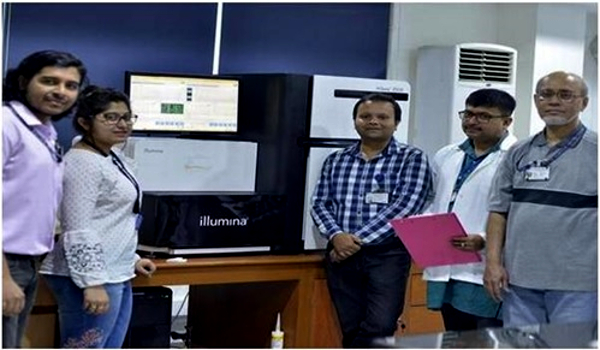A team of researchers headed by Dr. Partha Majumder of Department of Biotechnology’s National Institute of Biomedical Genomics (NIBMG), Kalyani, West Bengal has identified five biomarkers that could help develop new molecular diagnostic to predict lymph node metastasis in oral cancer patients more effectively.
The scientists have identified alterations in DNA, multiple genes and pathways associated with local lymph node metastasis in oral cancers. Metastatic lymph nodes carry cancer from primary sites to other sites. The team analysed exome-wide sequence and genome-wide copy number data and identified both heritable and non-heritable genomic alterations associated with lymph node metastasis.
Oral cancer is considered one of the most predominant cancers found among men in Indian subcontinent. It is mostly caused by chewing of tobacco. The cancer is often diagnosed at advanced stages which results in poor survival rates among patients. Most of the oral cancer reported global are found in developing/underdeveloped regions including India where per capita consumption of tobacco is high. In spite of many therapeutic advancements, there has been no significant improvement in survival outcome of such cancer patients in the last decade.
The Department of Biotechnology (DBT) has been participating in large scale international initiative of International Cancer Genome Consortium to identify genomic changes that drive oral cancer through two collaborating organizations. Mumbai-based Advanced Centre for Treatment, Research and Education in Cancer (ACTREC) conducts the clinical arm of the research, and the National Institute of Biomedical Genomics (NIBMG) carries out the genomic analysis part.
Oral cancer is considered one of the most predominant cancers found among men in Indian subcontinent. It is mostly caused by chewing of tobacco.
In the new study, scientists of NIBMG have discovered five biomarkers which can make it possible to tell in advance if a person with oral cancer of the gums and cheeks has lymph node metastasis or not. The prediction is 80-90% accurate.
Two of the biomarkers are rare heritable DNA changes in BRCA2 and FAT1 genes. The protein coded by FAT1 gene acts as an adhesion molecule that keeps the cells together. The loss of adhesion potential of cancer cells leads to spreading of cancer cells to secondary sites. The human BRCA2 is a care taker gene and it acts as tumor suppressor agent. Another novelty of this study is that it reported some rare alterations in BRCA2 genes caused metastasis. BRCA2 genes usually cause breast cancer.
The remaining three biomarkers are the non-heritable DNA alterations in genes belonging to mitotic G2/M cell cycle pathway, homologous recombination, non-homologous end joining DNA-repair pathways, recurrent deletion of genes for DNA repair by homologous recombination; and chromosomal instability.
The scientists have reported the findings of their study in high impact factor journal ‘International Journal of Cancer.
Source: Vigyan Prasar
Image Courtesy: Vigyan Prasar
You may also like
-
New Heat-Based Approach To Cancer Treatment Can Reduce Chemotherapy Doses
-
Scientists Take A Major Step Towards Unification Of Classical & Quantum Gravity
-
India Graphene Engineering and Innovation Centre (IGEIC) Under the Vision of Viksit Bharat@2047 Launched
-
New High-Performance Gas Sensor can Monitor Low Level Nitrogen Oxides Pollution
-
Antidepressant Drug can be Repurposed for Treating Breast Cancer
